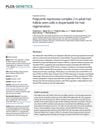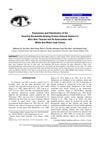 82 citations,
September 2018 in “Nature Communications”
82 citations,
September 2018 in “Nature Communications” A certain smell receptor in hair follicles can affect hair growth when activated by a synthetic sandalwood scent.
 59 citations,
April 2016 in “Cell Reports”
59 citations,
April 2016 in “Cell Reports” EdnrB signaling helps melanocyte stem cells regenerate and could be targeted to treat pigmentation issues.
 55 citations,
December 2014 in “Dermatologica sinica/Zhōnghuá pífūkē yīxué zázhì”
55 citations,
December 2014 in “Dermatologica sinica/Zhōnghuá pífūkē yīxué zázhì” Keratinocytes control how melanocytes work.
53 citations,
April 2016 in “Stem cell research & therapy” LL-37 helps stem cells grow and move, aiding tissue regeneration and hair growth.
 35 citations,
August 2021 in “npj Regenerative Medicine”
35 citations,
August 2021 in “npj Regenerative Medicine” Fibroblasts, cells usually linked to tissue repair, also help regenerate various organs and their ability decreases with age. Turning adult fibroblasts back to a younger state could be a new treatment approach.
 25 citations,
July 2019 in “Experimental Dermatology”
25 citations,
July 2019 in “Experimental Dermatology” Cholesterol balance is important for hair health, and problems with it can lead to hair loss conditions.
 18 citations,
October 2014 in “Experimental Dermatology”
18 citations,
October 2014 in “Experimental Dermatology” Local skin glucocorticoid production is crucial for healthy skin, and its disruption can lead to skin diseases.
 17 citations,
August 2019 in “Frontiers in Immunology”
17 citations,
August 2019 in “Frontiers in Immunology” Non-invasive methods show promise for diagnosing skin diseases like psoriasis and lupus but need more research for regular use.
 14 citations,
May 2012 in “Endocrine Research”
14 citations,
May 2012 in “Endocrine Research” The same hormone can affect gene expression differently in various tissues, which could lead to new treatments for conditions like hair loss.
 13 citations,
February 2023 in “Aging”
13 citations,
February 2023 in “Aging” A substance from hair follicle stem cells helps heal skin wounds in diabetic mice by promoting cell growth and preventing cell death.
 6 citations,
December 2021 in “PLoS Genetics”
6 citations,
December 2021 in “PLoS Genetics” Polycomb Repressive Complex 2 is not needed for hair regeneration.
 5 citations,
October 2022 in “Cosmetics”
5 citations,
October 2022 in “Cosmetics” Cell-based models help test if cosmetic ingredients really work for hair growth and skin health.
5 citations,
February 2021 in “Gels” HYDRO DELUXE BIO hyaluronic acid hydrogel is compatible with skin cells, may reduce inflammation, promote blood vessel growth, and protect against oxidative stress, suggesting it could help revitalize hair follicles.
 4 citations,
January 2020 in “Cells”
4 citations,
January 2020 in “Cells” The research found that the gene activity in mouse skin stem cells changes significantly as they age.
3 citations,
September 2021 in “BioEssays” Dandruff might be caused by changes in how hair follicles naturally release oils and an immune response to this imbalance.
 3 citations,
May 2021 in “Evidence-based Complementary and Alternative Medicine”
3 citations,
May 2021 in “Evidence-based Complementary and Alternative Medicine” Some traditional Chinese medicines may have anti-aging benefits and could help with hair growth, but more research is needed.
 3 citations,
January 2012 in “Wageningen Academic Publishers eBooks”
3 citations,
January 2012 in “Wageningen Academic Publishers eBooks” Hair health depends on various factors and hair loss can significantly affect a person's well-being; understanding hair biology is key for creating effective hair care treatments.
 2 citations,
September 2023 in “Scientific reports”
2 citations,
September 2023 in “Scientific reports” The nanocomposite films with vitamins and nanoparticles are promising for fast and effective burn wound healing.
 2 citations,
July 2022 in “Frontiers in Medicine”
2 citations,
July 2022 in “Frontiers in Medicine” The cause of Frontal fibrosing alopecia, a type of hair loss, is complex, likely involving immune responses and genetics, but is not fully understood.
 2 citations,
May 2022 in “Cosmetics”
2 citations,
May 2022 in “Cosmetics” Further research is needed to understand how the microbiome affects hair loss in Alopecia Areata.
 1 citations,
January 2016 in “Asian-Australasian journal of animal sciences”
1 citations,
January 2016 in “Asian-Australasian journal of animal sciences” The protein Gnαs is found more in black mice than white mice and may influence their coat color.
 November 2024 in “BMC Research Notes”
November 2024 in “BMC Research Notes” SIRT3 and SIRT7 genes may play a role in hair loss.
 May 2024 in “Scientific reports”
May 2024 in “Scientific reports” Twist2 is essential for scarless skin healing and hair growth in mouse fetuses.
 April 2024 in “Cell death and differentiation”
April 2024 in “Cell death and differentiation” Cell death shapes skin stem cell environments, affecting inflammation, repair, and cancer.
 April 2024 in “Biomedicine & pharmacotherapy”
April 2024 in “Biomedicine & pharmacotherapy” Pilose antler extract helps hair grow in mice with a type of hair loss by speeding up the growth phase.

Certain natural products may help stimulate hair growth by affecting stem cell activity in the scalp.
 July 2023 in “Current Issues in Molecular Biology”
July 2023 in “Current Issues in Molecular Biology” Escin may help treat hair loss by boosting a specific cell growth pathway.
 June 2023 in “Plastic and Reconstructive Surgery – Global Open”
June 2023 in “Plastic and Reconstructive Surgery – Global Open” Exosomes may improve skin, scars, hair growth, and fat grafts in plastic surgery, but more research is needed.
 April 2023 in “Medizinische Genetik”
April 2023 in “Medizinische Genetik” New research has found 14 genes linked to the risk of developing alopecia areata, improving understanding and treatment options.
ILC1-like cells can independently cause alopecia areata by affecting hair follicles.


























